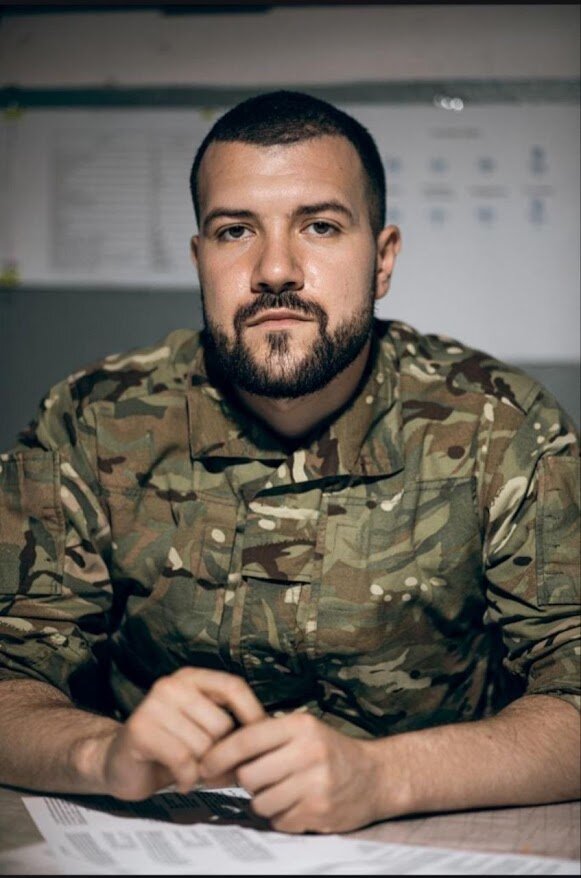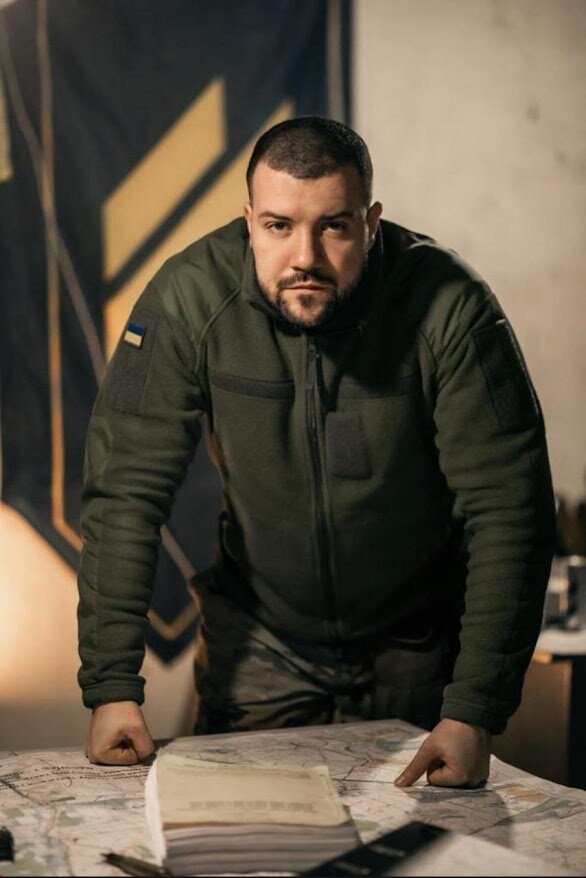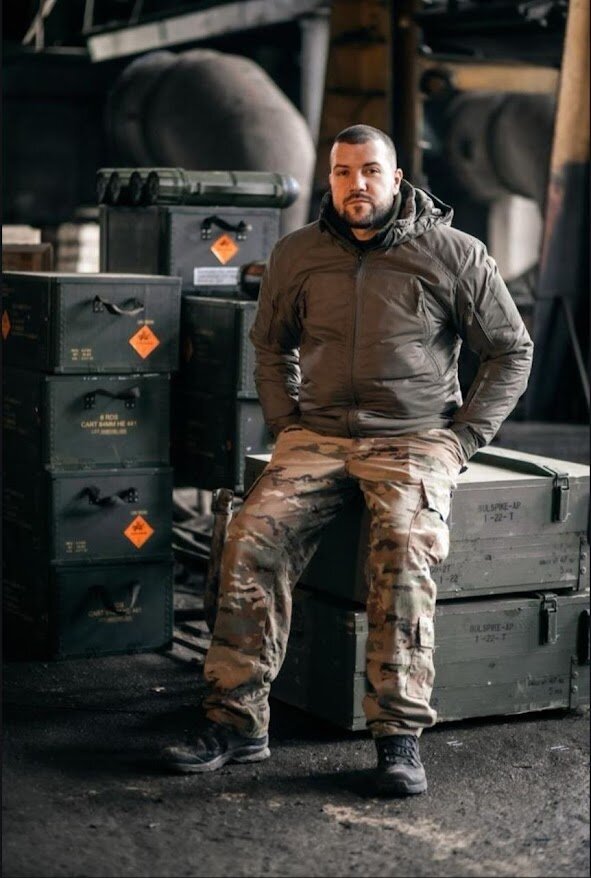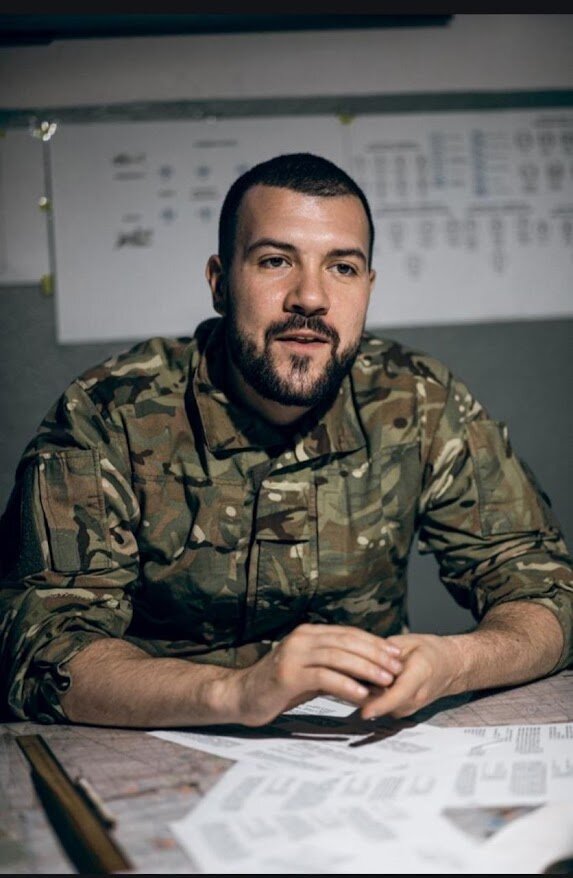Major Rodion Kudriashov: "In modern army, it is necessary to rely not on quantity, uncoordinated orders and statutory decisions from past, but on quality"
ATO/JFO veteran Major Rodion Kudriashov is a hereditary military man who had not considered this profession before the Russian-Ukrainian war. However, the situation in the country changed his life plans.
At the beginning of 2014, he voluntarily joined the ranks of Azov, which was just being formed at the time. He gradually climbed the career ladder. Today he is the deputy commander of the 3rd Separate Assault Brigade, one of the most successful units in the Armed Forces of Ukraine. We spoke to Rodion about his military career and the pressing problems facing the Ukrainian army.
- Why did you decide to go to war?
- Until the beginning of 2014, most of the Ukrainian population had a negative attitude toward the army. Including me. All these popular discrediting stories about "hazing", about those who did not enter higher education institutions going there, and about poor provision played a role. In my opinion, they have antagonized a considerable number of young people from joining the Armed Forces and law enforcement agencies. These areas have gone in the doldrums dramatically because of the lack of motivated people. And when the Anti-Terrorist Operation began, it was these people who went voluntarily without being mobilized. Thanks to their ideological convictions, they were able to bring our army to another level and continue to do so to this day. Yes, now it is not one hundred percent attractive, not as full as I would like to see it. But it is much better and more powerful than before the war.
- Your grandfather was a lieutenant colonel in the Soviet army. Did you talk to him about the Second World War? Do you remember these conversations now at the front? Do you compare them?
- Yes, I talked to my grandfather a lot about World War II. I asked him about his military career, how he joined the army, how he felt there, what problems and victories he had in his life. To this day, I remember what he said: "War is bad. Any soldier who has lived through such hell will do everything to prevent it from happening again." I went to the graves of unknown soldiers, laid flowers and thought that we should make every effort to avoid war, but if it happens, we should do our best to win.
- The war finally came to us in early 2014. You went to war even though you were only 21 years old. What were your thoughts and feelings?
- The main thing was a strong sense of justice. I saw a lot of unfair things and things that put us, Ukrainians, in a negative light. I was confused by the steps and statements of the separatist authorities of the so-called Luhansk and Donetsk People's Republics. I observed how such sentiments were spreading in my hometown of Dnipro. I really wanted to avoid it all. That's what prompted me to volunteer and go to defend my home, city and country.
- In an interview, you told me that you chose Azov because the recruitment system here worked better than others: it was a simplified procedure that required fewer documents. All you needed was a desire. At that time, it was still a unit of "black men" the size of a company tactical group...
- I would like to emphasize once again that it was a young team with new ideas, particularly in recruiting, planning, and managing the future composition of the combat unit. It was this modern and flexible system that attracted me. That's why I joined Azov, which, indeed, was still a "black man" unit at the time, and then evolved. This structure expanded a lot over time. I would like to note that it is the first volunteer unit that is now the foundation of the Armed Forces of Ukraine and the forceful resistance to terrorists from the Russian Federation. It is thanks to volunteer fighters that today we have at least three quite powerful and most capable units in the country. These are the Azov National Guard Brigade, the Kraken unit of the DIU of the Ministry of Defense, and the Third Assault Brigade.
- What was the main thing you learned at Azov?
- That there is nothing impossible. I saw that the formula for success is as follows: 25 percent experience, another 25 percent desire, 10 percent luck and good fortune, and the main thing here is motivation and understanding of what you are doing. In other words, seeing the goal and overcoming obstacles on the way to achieving it. This is what the Azov military team taught me. We are now passing on this experience to newly arrived soldiers and future officers. I want all these ideas to form into a certain concept, ideology and traditions that are very much needed by our army.
- It was in Azov that you began to climb the career ladder - you grew to become the battalion's intelligence officer. After that, I was in the reserve, and at the beginning of the full-scale invasion, I headed the TDF battalion. Later you were assigned to the Third Assault Brigade. How did you get here and become a deputy commander?
- At the beginning of the full-scale invasion, many of our reserve officers were in civilian organizations, including the Azov Civilian Corps, which I headed, and met the invasion at their workplaces. Everyone received a command to form their own units, so that after the situation stabilized, they could gather in more powerful military "fists" and work together. I was in Dnipro at the time. On the very first day of the large-scale invasion, I filled out the entire staff list of the territorial special operations forces battalion that I was assigned to form units on an emergency basis, deploy defense in the Dnipropetrovsk region, and move on to defense and future tasks. I took them on voluntarily, taking the initiative. I came to the regional state administration and talked to the military, who then headed the joint commands of the TDF and the Ground Forces. At the time, they were confused and did not know what to do. Now we can talk about it frankly, without keeping it secret. I believe that we need to voice this truth. So, many of my comrades who were in the Azov Central Committee's public organization began to form units. After that, Andrii Biletskyi, who headed one of the largest units, the Azov-Kyiv Special Operations Forces, appealed to the president with an initiative to the then Commander-in-Chief to allow us to implement something more powerful within the Ground Forces. It was met with a positive response. These leaders issued a directive to form the Third Assault Brigade, which was formally to be created on the basis of such units as the Azov-Kyiv SOF, the Territorial Defense Battalion of the 98th Brigade, which I headed, the Poltava Territorial Defense Battalion, and others. This was the first step in assembling the new unit. Two months were spent on training at the training ground, and then on performing combat missions in the brigade's formation in the Kherson region during our large-scale counteroffensive and the liberation of Kherson, in which the battalion tactical group of the Third Separate Assault Brigade participated. That was the beginning of its combat career. At first, I became the commander of the operational department, which was fully responsible for the performance of combat missions, and then the deputy commander of the Third Separate Assault Brigade.
- Do you have your own "recipes" for interacting with soldiers? I often hear from commanders that the main thing is to find an approach and be able to build communication properly. Do you have a "secret of success"?
- It is necessary to bring motivated people to responsible positions who can be responsible for their words, commands, instructions and, most importantly, have experience - so that they have a vision of how to implement tasks.
Indeed, one of the main "recipes" for successful task performance is communication. To establish it, the team must have friendly and fraternal relations - this is the microclimate. To achieve this, the command must take many steps. One of the main ones is equal treatment in the format of subordination between an officer and a soldier. The Soviet management system declares old methods of organizing military teams. After the dissolution of the USSR, we took this inheritance from the Armed Forces. The experience of good equal fraternal communication was reproduced only at the beginning of the ATO, when volunteer fighters and initiative people who had never been in the army before joined the ranks. So, as far as secrets go, there is nothing complicated, but the process requires the direct involvement of commanders. There must be healthy communication that helps and allows the soldier to understand what is required of him, what the risks are, what is being done to ensure that the tasks are completed both in terms of destruction and the safety of everyone. In a modern army, we need to rely not on quantity, not on uncoordinated orders and statutory decisions from the past, but on quality, which is accompanied by flexibility in decision-making, equal communication, and other things.
- In particular, creativity, which is at a high level in our military.
- And creativity. By the way, one of the annotations of the Armed Forces of Ukraine's charter is a withdrawal, which states that all aspects of the charter are subject to implementation, but they will be of higher quality if approached with creativity and imagination.
- How would you generally describe your military career over these ten years?
- For me, these ten years have passed quite quickly - from second-in-command of a machine gunner to deputy commander of one of the most capable units in our country. There were many problems along the way. I won't talk about the ones in the realm of physics - about heavy loads, because my motivation overwhelmed everything. One of the main problems that accompanied me and my military team, and remains to this day, is the lack of motivation of some other servicemen. To put it in simple terms, it is a constant struggle with old-style officers who continue the traditions of the Soviet army, relying on the education they received before Ukraine's independence. I would not like to spend precious energy fighting the old system. But this is necessary solely to develop our army to make it super powerful. .
- There is another problem that, in particular, hinders this development process: mobilization. The military often says that mobilization is a failure, even though a new law has already come into force. What picture do you see here?
The mobilization was supposed to begin on the third or, at most, on the fifth month after the start of the full-scale invasion. If we look at the number of people mobilized today, we can say that mobilization has indeed failed. However, this does not mean that we should not address these issues and work on new measures to improve our defense capabilities. I see a lot of problems now. If we start analyzing them, we will need additional time for another interview to understand this topic. Now I will tell you how I feel about it. In the tenth year of the war, after nine years of service, I received a draft notice for the first time at the address where I live. I want us to look at this situation from a different perspective: it finally delivered, which means that somehow the military enlistment offices started working. I hope that the military and civilians will understand that mobilization is not a one-sided process when representatives of the TCR catch people on the streets and try to hold campaign events to recruit people into the army. This should not be the case. This impulse should come from both sides. People also need to be understanding of today's realities, including the mobilization process. When these two directions meet each other, we will have better results in mobilization and at the front in general. Today, unfortunately, with the help of Russian propaganda and psyop, they are not moving in this way. They deliberately share videos about certain actions of the TCR and provocations of civilians. This story is being shared to destabilize the situation and disrupt the mobilization process.
- But there are also real draft dodgers who are deliberately hiding, fleeing abroad, even risking their lives. If you were to address them, what would you say? Is there any need to have a dialog with them at all?
- When there is no responsibility for certain actions, there will always be a certain danger. If this situation is imposed on draft dodgers, then when it is tolerated, it will not be punished. I see the problem in the way people turn a blind eye to this or that propaganda, knowing who it comes from. Without certain punishments, draft dodgers will not just hold their heads up, but will not feel responsible for their actions and words.
What would I say? Simple things that the draft dodgers won't understand right now. But perhaps this will provoke reflection for those who read us. Any draft dodger, regardless of his age, needs to realize that we are at war with the Russian Federation, which attacked us in 2014, hiding its flag and covering its motivation with political slogans. Already in 2022, the Russians began an outright large-scale invasion and continue to carry out terrorist acts throughout the country - I mean, shelling civilian targets. We all need to understand that Russia will not stop until it has broken the Ukrainian resistance. The Russians realized that they would face sanctions, that the whole world would hate them, but that did not stop them. The only thing that can stop it is the resistance of all Ukrainians, who must realize that our freedom and independence can only come through victory over Russia.
- The Third Assault has been recruiting for a long time. I know that people are joining you. What attracts them?
- This is because the Third Assault Brigade is a family. Discipline reigns here, but there is an atmosphere of combat brotherhood. The initiative is highly valued here. Our fighters are constantly training and improving themselves whenever possible. They work with modern weapons, which we spend a lot of time and resources to acquire, as we purchase some of them on our own.
In addition, we have combat and experienced commanders who have endured the suffering and hardships of war since its beginning. They understand how to use soldiers and take care of them. These people were not just appointed to their positions. They have gone from infantryman to unit commander and experienced what it is like to fight in a trench, not just talk about it. We have detailed and high-quality planning and rehearsal of combat operations. We never shy away from recognizing our mistakes in order to do it all over again. Therefore, in my opinion, our unit has the lowest percentage of losses. I also consider this an achievement. Plus, the work of recruitment centers. They are already operating in four cities: Kyiv, Lviv, Dnipro and Odesa. People can come there and get all the information about service in the unit, current vacancies, etc. We also hold a test week. However, it works only in Kyiv and is opening in Dnipro. We provide this option so that future servicemen can experience what service is like, see their skills and understand what is currently happening in the army.
- Now the Third Assault Battalion has also joined in mobilization of prisoners. I know that Slip, the commander of your 2nd Assault Battalion, is already traveling to meet with them. How is the process going?
- This government initiative is aimed at increasing the percentage of mobilization activities. Today we have just started to try to implement this direction. You mentioned Slip - Dmytro Kukharchuk, who is now directly involved in this issue, travels to the colonies and tries to find motivated people who will voluntarily join the Third Assault Force. The numbers and results of these activities are still unknown. I do not expect that we will cover all the mobilization needs thanks to this. But we need to use all available avenues to develop the Armed Forces, including our unit.
- In order to develop the Armed Forces, we need to think ahead. In this regard, I recall your words that every citizen of Ukraine who has turned 18 must undergo basic military training. How do you encourage young people? How can this " work" in the long run?
- Nothing could be better than today's realities. All conscious young people understand that nowadays they need to know at least the basic steps to provide first aid, what to do when an air raid alert starts, and all other safety issues related to the current realities of life. In order for young people to be more attentive to this, the authorities must do the appropriate work. Local governments should launch municipal programs that would specialize in pre-military training for civilians. And not just the younger generation. This does not require large resources. There are many military personnel who have been discharged due to certain health problems. They can help and become managers who would share their experience with civilians.
- Speaking of support. Recently, there has been talk that the level of civilian support for the military has decreased. Do you feel it?
- It's hard for me to feel this way because I very rarely go to the rear cities. As a deputy commander, I spend all my time on the front line. But representatives of friendly charitable foundations tell me that, indeed, the motivation and support of civilians is declining. I do not know why. Either because of exhaustion or demotivation... But today, one of the main areas of support for civilians is not even donations or volunteering, but direct support for the Armed Forces. I see no deterioration here. It is very nice to see the drawings from children and the messages they send us. I feel that we are not doing everything in vain. I would like to take this opportunity to thank everyone who supports the Armed Forces, in particular our Third Assault Brigade. This is a crucial incentive for us.
- Is there any way to encourage people? In particular, to stimulate business. Obviously, at the beginning of the full-scale war, the support here was much stronger than it is now...
- Of course, it is possible. But these are questions for the government that do not concern the army. Some companies need certain concessions, both in terms of mobilization and tax legislation. The state should recognize those companies that help. I have not seen much of this. The military thanks them, but the government somehow turns a blind eye and does not realize its duty to pay tribute to the business that is involved in helping the Armed Forces.
- I know that you are conducting research as part of your postgraduate studies. Could you tell us more about what it is about?
- I started this work even before the large-scale invasion when I entered the Customs Academy of Dnipropetrovsk region. The idea I am proposing was formed throughout my social activities. The title of my thesis: "The Importance of the Contribution of Informal Public Subcultural Organizations to the Defense Capability of Our Country". With this work, I would like to talk about my path, about how structural measures are directly correlated with the creation of "black men," "Azov," the Third Separate Assault Brigade, and other units that had nothing to do with the army and security agencies before the war, and today have become a powerful foundation for the country's defense capability.
- Can we say that this is a guide for those who have not yet gone to war but are planning to?
- And also for the authorities, who have not previously supported such young public subcultural associations. This is a roadmap that explains what will happen if the government does not support organizations that work exclusively for the benefit of our country.
- So let me ask you: what is the level of military culture in Ukraine today?
- It depends on what you compare it to. If we compare it to 2010, then in 2014 great steps were taken. Today, military culture is developing, the elite is becoming more powerful. I see a lot of officers who were lieutenants not long ago and have now been promoted to the rank of major and captain, appointed to leadership positions and moving the army forward. In addition, many businesses are being reoriented and expanded into military-themed businesses, thereby improving the military-industrial complex.
- How can we increase it?
- One of the key aspects here is the flexibility of the government system. We need quick and effective solutions. Like the creation of the Unmanned Systems Forces of the Armed Forces of Ukraine. Young and motivated people need to be put in responsible positions and combine old experience with young initiative. Today, unlike in 2014, this story has become more significant - that is, young people have started to move in combination with experienced officers. We have to develop faster in today's realities. And they are such that technical revolutions are taking place on the battlefield - that is, with a change in the means of destruction, from artillery, small arms, to modern drones. There is a constant evolution. This changes the state of affairs;. So we need motivated people who are ready for changes and new solutions. In general, I believe that this war will be won not by generals, but by our soldiers, sergeants, lieutenants, majors and captains.
Olha Moskaliuk, Censor. NET





